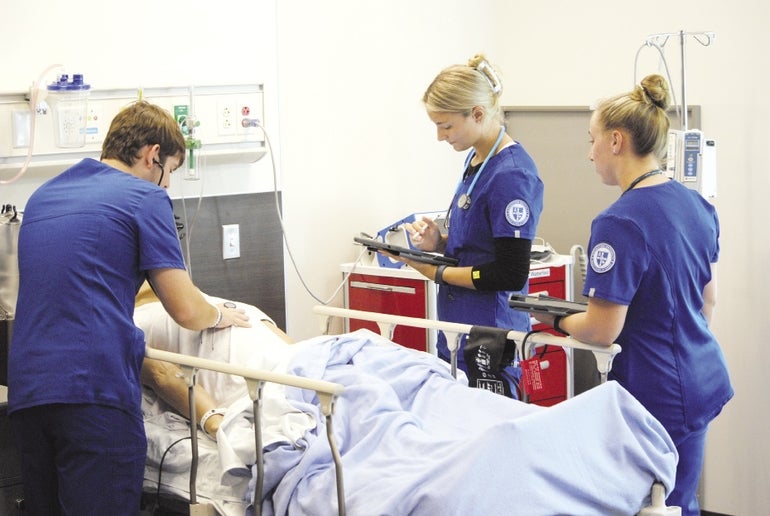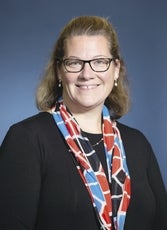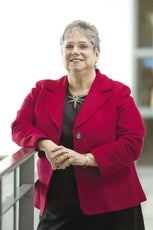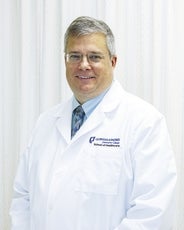
Central Mass. colleges and universities are expanding their nursing programs to meet demand
 Photo | Courtesy of Assumption University
Nursing students at Assumption University practice on a medical robot.
Photo | Courtesy of Assumption University
Nursing students at Assumption University practice on a medical robot.
The nursing shortage is a Central Massachusetts and national problem rooted in demographics: The millions of Baby Boomers who entered the field are now approaching or at retirement age. Other factors, especially the burnout accompanying the COVID-19 crisis, have accelerated the trend. At the same time, a growing and aging population is demanding more nursing services than ever before.
Indeed, according to international management consulting firm McKinsey & Co., by 2025 the U.S. will likely experience a shortage of 200,000-450,000 nurses. Similarly, the U.S. Bureau of Labor Statistics Employment Projections for 2019-2029 rank registered nurses among the most in-demand professions through 2029.
To help make up some of this shortage, Central Massachusetts colleges and universities are expanding their nursing programs to meet the growing need.
Quinsigamond Community College in Worcester and Mount Wachusett Community College in Gardner each received grants to improve the facilities for their nursing programs. Assumption University in Worcester launched a specialized graduate nursing program. Worcester State University has expanded through absorption of the nursing students who had been attending Becker College until it closed down.

Assumption’s accelerated program
“We in Massachusetts are experiencing a nursing shortage that was made much, much worse by COVID,” said Caitlin Stover, dean of the Froelich School of Nursing at Assumption University.

The drain of patient care, the nurses working long hours, and the emotional drain of supporting patients who either were battling COVID and couldn't make it or did make it, all added up to a career-defining moment, Stover said.
The pandemic left healthcare professionals with lingering post-traumatic stress disorder issues, so it’s no surprise many have since chosen to leave the profession, she said.
The Froelich school’s arrival on the scene four years ago turns out to have been very timely for the region. However, said Stover, despite having a healthy program in place, there was an opportunity to do more.
“It was important for us to think about what makes us unique and try to provide programming that isn't available at other institutions,” she said. “That's where we came up with the accelerated nursing program.”
Assumption’s nursing program offers a new post-bachelor’s accelerated nursing track, delivered as a hybrid, 16-month program. Harnessing potential career-changers who already have a bachelor’s degree provides an opportunity to provide high-quality registered nurses to the region more quickly, Stover said.
The program launches in June.
WSU graduating Becker’s students
Linda Larrivee, dean of the School of Science, Technology and Health at Worcester State University, said the talk of a nursing shortage has been ongoing throughout her tenure at the school.

Since its launch in the 1970s, the nursing program has evolved different tracks for different kinds of students; for instance, a traditional four-year bachelor’s program as well as a shorter program for students with an associate’s degree and a registered nurse credential.
“That is in response to many healthcare organizations that want their RN nurses to have a bachelor’s degree,” Larrivee said.
The program graduated a steady average of about 40 students each year, a number that even COVID didn’t alter. What did change, she said, was the number of associate degree holders coming in the door because they were working so hard during the pandemic they couldn’t consider adding school to their schedule, she said.
In the spring of 2021, coincident with the later stages of COVID, the biggest program change at Worcester State came: the closure of Becker College in Worcester, which was operating an established nursing program.
“We took them on, and we are still working to graduate them,” she said.
That undertaking required an immense amount of tailoring to meet students where they were in their education, but the end result will be adding dozens more graduates to the nursing supply of the region, she said.
QCC looking for more
Quinsigamond Community College, whose nurse education program completed a comprehensive reaccreditation process in 2021, which resulted in a recommendation for the program to receive an eight-year accreditation, found itself unexpectedly asked to take on a chunk of the Becker student body.

QCC was contacted by Worcester State and asked to take on a share of the students forced to transfer, said Pat Schmohl, dean of QCC School of Healthcare.
“We were able to facilitate that by making some changes in our transfer policies in order to accommodate that influx of students,” Schmohl said.
However, it involved tremendous work by faculty and staff since students came onboard at many different stages in their education. Since then, the school has sent almost 60 of those students on to the workforce.
In August, QCC was awarded a state Skills Capital Grant, worth nearly $500,000, which will be used to update three nursing labs at its Healthcare and Workforce Development Center. The labs enable nursing students to have hands-on training on the most state-of-the-art equipment, which is crucial in preparing them for a career in the field of nursing.
While that might seem like a step forward in helping to train more individuals for nursing careers, Schmohl and Patricia Creelman, professor of nurse education, stress the funds do not increase capacity; they only help maintain the facilities.
In fact, they said, lack of funding is keeping them from expanding their programs further.
MWCC’s 96 graduates
Mount Wachusett Community College this past spring held a traditional pinning ceremony for the graduates of its associate degree in nursing program, the school’s 49th graduating class.
The class was made up of 96 students enrolled in either the day nursing program or else licensed practical nurses who returned to MWCC to continue their education through the Bridge to Nursing program.
Graduates of the program have historically had a high pass rate on the National Council Licensure Exam for Registered Nurses. Many students also use the program to transfer into a baccalaureate nursing program, according to data provided by the school.
Like QCC, in July MWCC secured a $500,000 state Skills Capital Grant to upgrade equipment and facilities, in particular, its two simulated health science labs and associated control and debriefing rooms.
WBJ Web Partners
If only they could increase their acceptance into their medical programs. The waiting lists are discouraging to get into programs like Radiology Tech & Ultrasound Tech.












1 Comments